Where are you going, my pretty maid? Why go to conferences?
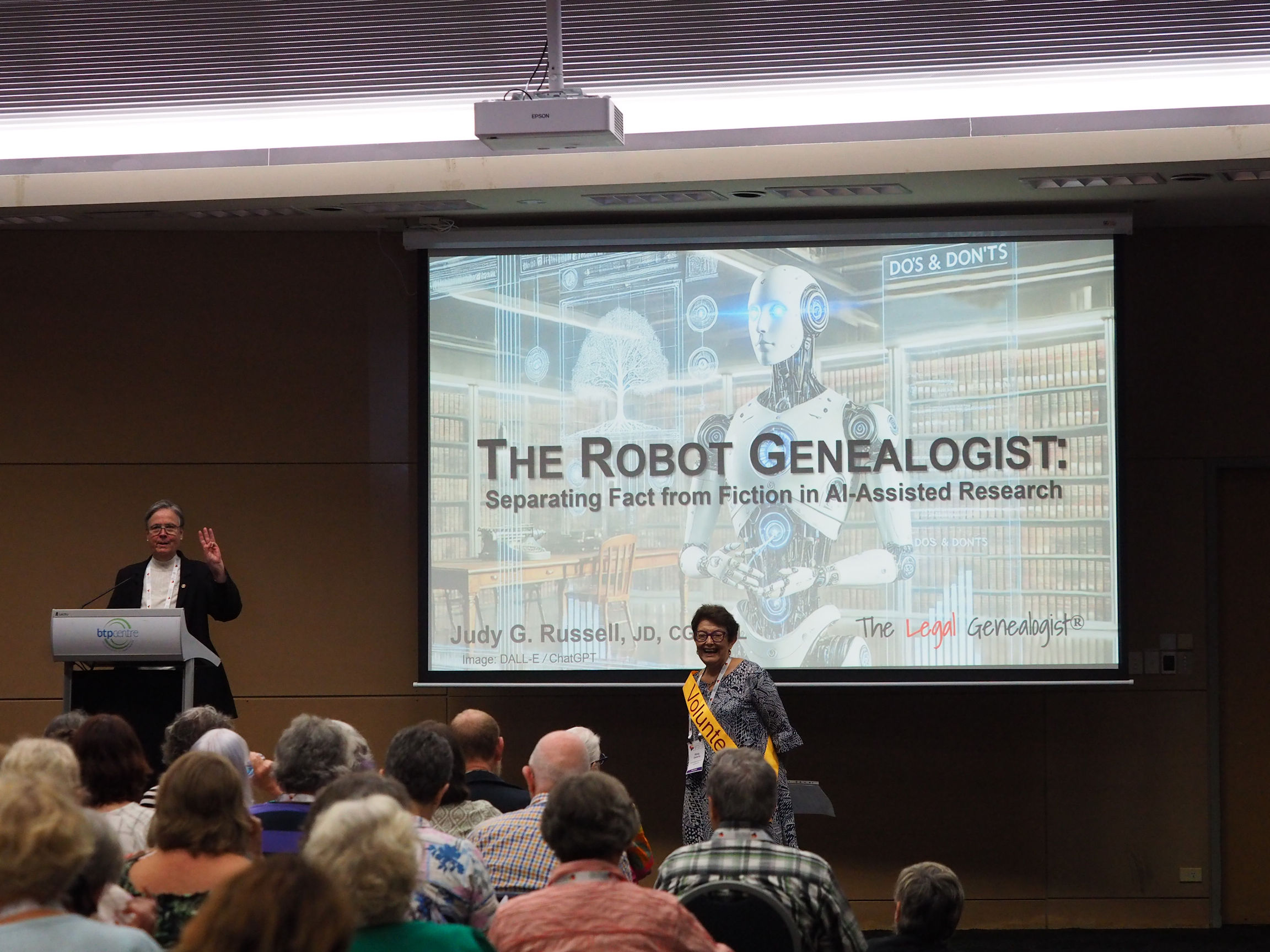
Keynote speaker, Judy G. Russell presenting at the recent conference. Image by Connections2025 photographer, https://www.connections2025.org.au/
“Ooh, look is that the American guest speaker over there? She was fabulous the last time I saw her! Must NOT miss her sessions or a chance to chat with her.” Conferences are such good fun. They are great places for learning; wonderful for meeting and catching up with friends and making new ones, too. Not only that, but we can also observe and absorb how other people tackle the same family history problems we all have. Importantly we can put faces to names – so the Legal Genealogist/Judy G. Russell becomes a ‘real person’. Even ‘newbies’ go home with new networks.
The recent Connections: Past-Present-Future conference conducted jointly by the Australian Federation of Family History Organisations (AFFHO), History Queensland (HQ) and the Genealogical Society of Queensland (GSQ) from 21-24 March at BTP Conference & Exhibition Centre at Eight Mile Plains in Brisbane convincingly confirmed multiple advantages of attending these events. Connections represented both AFFHO’s 17th Australasian Congress on Genealogy and Heraldry, and the 5th History Queensland Conference and was organized most efficiently by an active and dedicated GSQ committee comprising Helen Veivers, David Barnes, Marg Doherty, Michael Murphy and Jan Bimrose with Kay Ryan representing AFFHO & HQ.
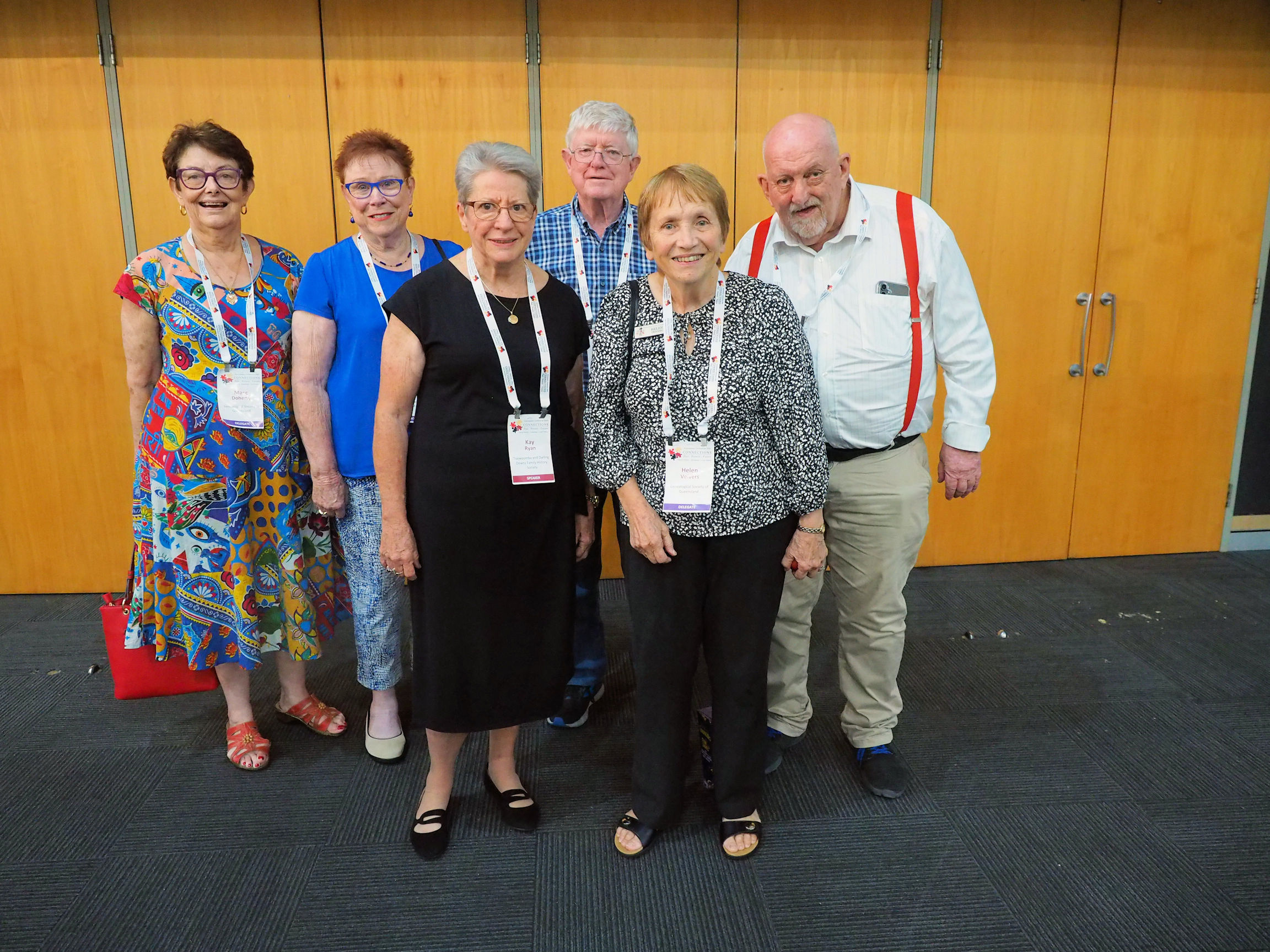
Conference organising team. Image by Connections2025 photographer. https://www.connections2025.org.au/
The Learning Aspect:
At each session, speakers could select from nominated themes to present insights. The first category, Diaspora, Migration in all its forms emphasized that all Australians, apart from First Nations people, are immigrants. What were their unique or shared experiences? The second, Looking Ahead What are the Opportunities? asked us to consider new methodologies, employ every prospective tool and assess possible brick-wall solutions in an increasingly technological world. The third option, Local History and its impact on our research, highlighted the importance of placing our ‘people’ research into specific locations, encompassing where to gain geographical insights, the establishment and subsequent growth of villages and towns, and importantly, to inform about the wealth of material available.
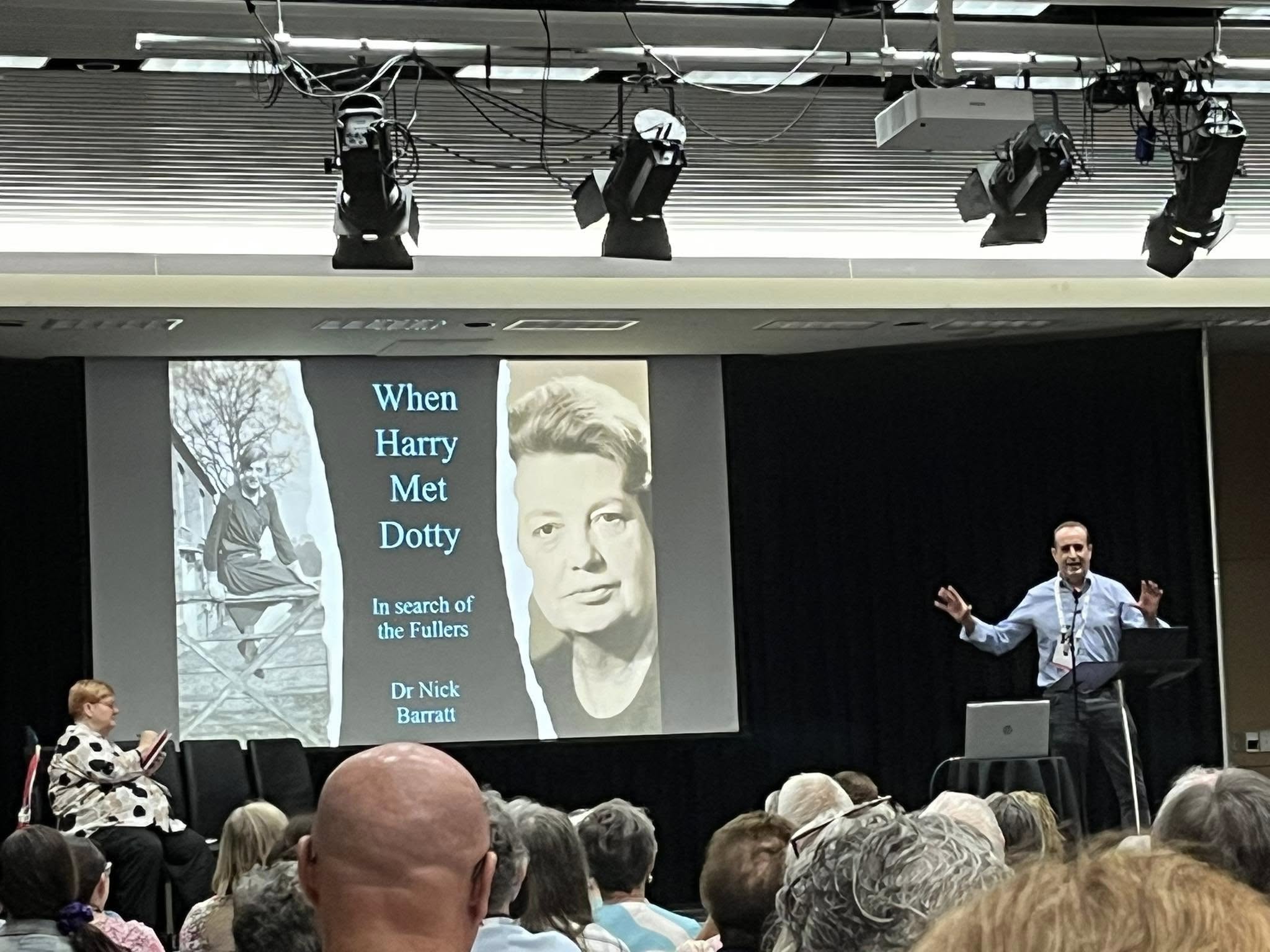
Keynote speaker, Dr Nick Barratt presenting at the recent conference. Image by R.Edes.
Carefully chosen papers ensured a balance between topics giving audiences a challenging abundance of selections. The programme, generally offering a choice between three simultaneous sessions, posed the first serious quandary?? Help, help which session should I attend. That presenter is always most informative, interesting and entertaining but this other subject might provide answers for my country town research while the third lecturer is an old friend, or someone I have been mentoring, how is she going? And I thought I had planned my intended involvement before I arrived. Each and every speaker provides new information as, inevitably, individual researchers discover different characteristics even when referring to identical primary sources. All can contribute to my stories. Where lies my loyalty or need?
For most of us conference preparation commenced months before the occurrence as a treasure chest of quality pre-convention information was issued to the potential audience included professionally produced detailed paperwork describing speaker experience, content and synopses. Most useful in adapting to an unfamiliar setting was a site map of amenities providing basic locative information for planning meetings and determining sit-down areas for morning and afternoon tea breaks, plus lunch distribution points. Comfort of delegates seemed to be a motivating spur. Efficient technology ensured contented unflustered presenters, while relaxing chairs, balanced air conditioning, clean facilities, and tasty food & teas/coffees were readily available to ensure recovery of spirits preparatory to the next exciting lectures.
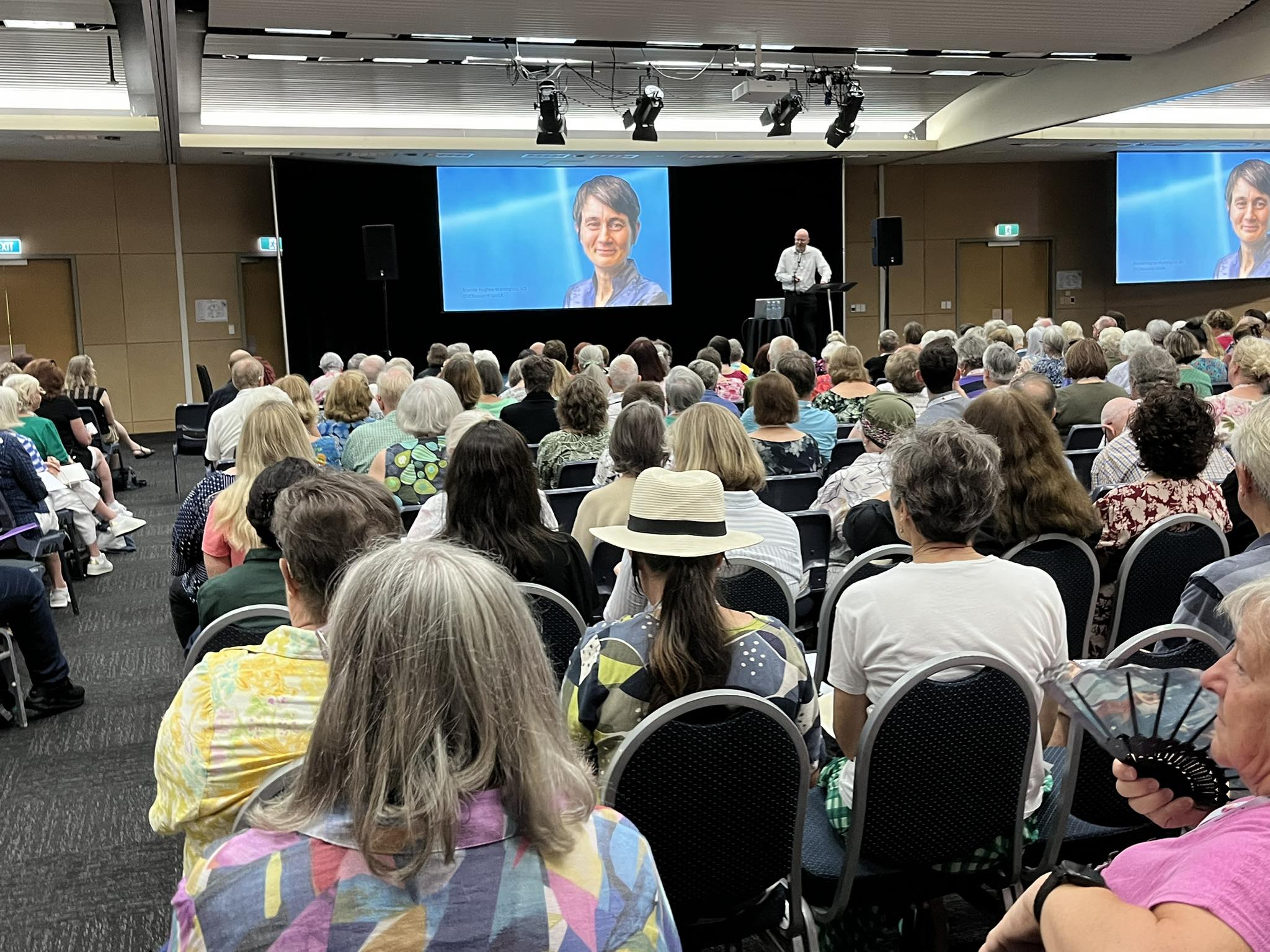
Keynote speaker Hamish Maxwell-Stewart presenting at the recent conference. Image by R.Edes.
Near the registration booths several stalls demonstrated work by professional services, with several societies advising of specialized activities and research support, while well-stocked book shops opened many wallets when tempted by the offer of, often out-of-print, reliable reference material. Why can’t I carry more? This plaintive call was accompanied often by a wistful: And where will I shelve them when finally reaching home? But I just cannot resist this bargain. Also how wonderfully reassuring to see familiar smiling faces from the State and National Archives and Library at information desks. They readily offer knowledgeable solutions to sources and how to spend your research hours most effectively.
For me, one of the most heart-warming benefits of conventions is reconnecting with old friends, especially interstate and co-presenters from all over the world. While audiences are introduced to speakers, our supporters remain unknown parties. We mainly rely on eye-contact during lectures and cannot always immediately recognize everyone who has asked questions on former occasions or who have emailed for advice or have bumped into us in crowded repositories. Each reunion is valuable even if instant recall may need prompting by mentioning problems solved. We rarely forget those ancestors whom we have scrutinized and I count many of these and their diligent descendants as close companions. Some names or faces may be familiar through society journals or newsletters and we feel we know them well even though we have never been officially introduced. Others we have met at conferences in quite distant locations and these shared experiences contribute significantly to our well-being. People bound by activities get together such as the bead-bedecked bloggers. Further, gatherings give the opportunity to congratulate people on jobs well done or results obtained. Boosting and appreciating volunteers and recognizing contributions is important to members of all societies.
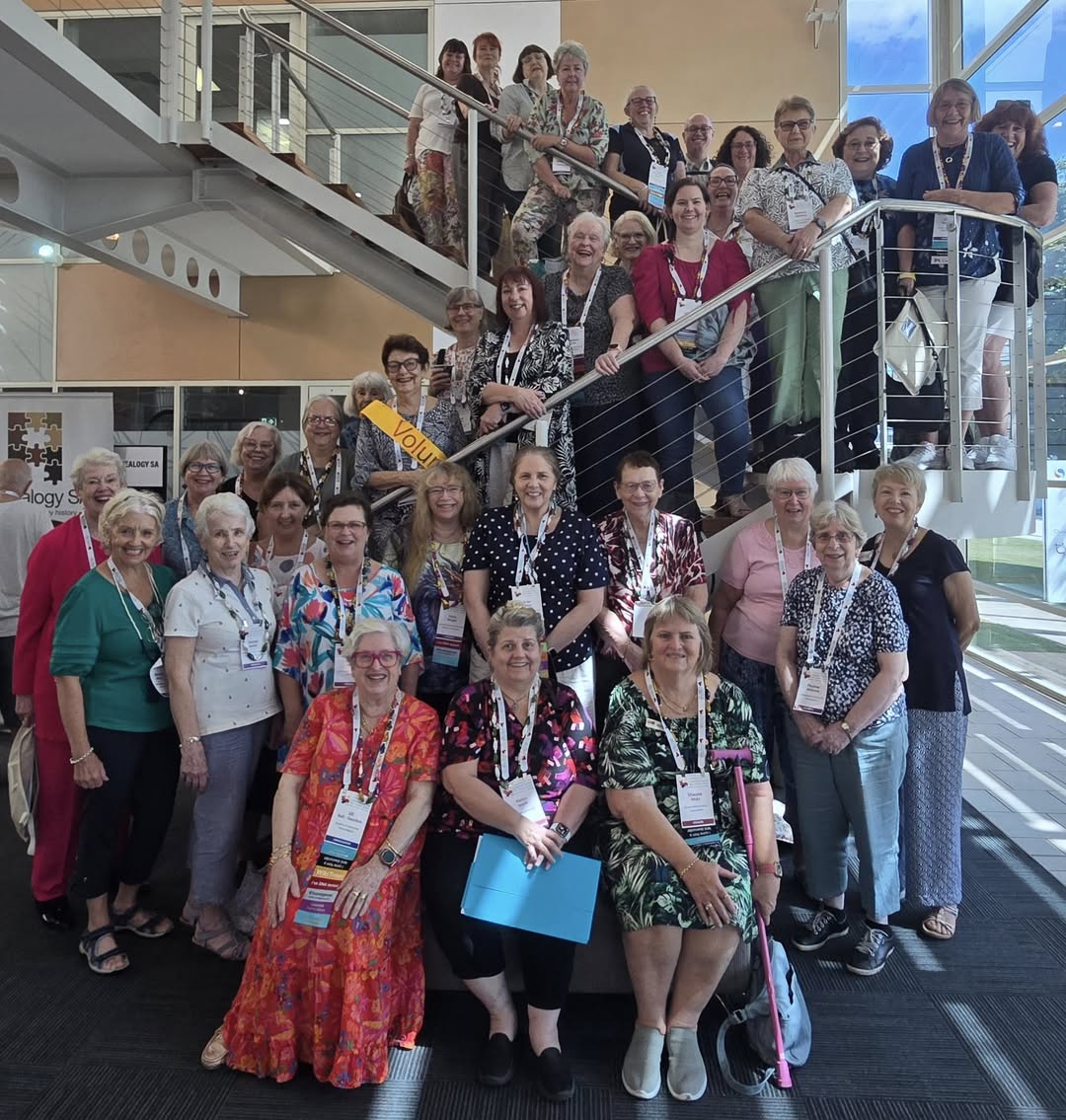
Bloggers at the recent conference with author Jennifer Harrison in red on left at the foot of the stairs, as well as 12 other of our GSQ Bloggers. Image by Connections2025 photographer. https://www.connections2025.org.au/
I had a ball over these three days and consider each dollar well rewarded by multiple learning experiences. It is my heartfelt desire that others should ‘play this game’ and benefit to the same extent. Now, a few weeks later, I remain on a high as I plan and implement techniques, methodologies, and pursue my newfound discoveries. Who knew that my favourite repositories, the John Oxley Library and Queensland State Archives held so many more wonders that I had yet to discover despite almost a lifetime devoted to exploring their riches. I have already signed up for the Royal Historical Society of Queensland’s Settlement Conference scheduled for 17 May 2025 to mark the transference of the Moreton Bay outpost from Redcliffe to Brisbane Town exactly 200 years ago. I truly regret that I cannot make Darwin at the year’s end on Hot Histories for the Professional Historians Association although their topic has inspired yet another avenue to explore. My cup runneth over. P-l-e-a-s-e let me come with you, pretty maid?
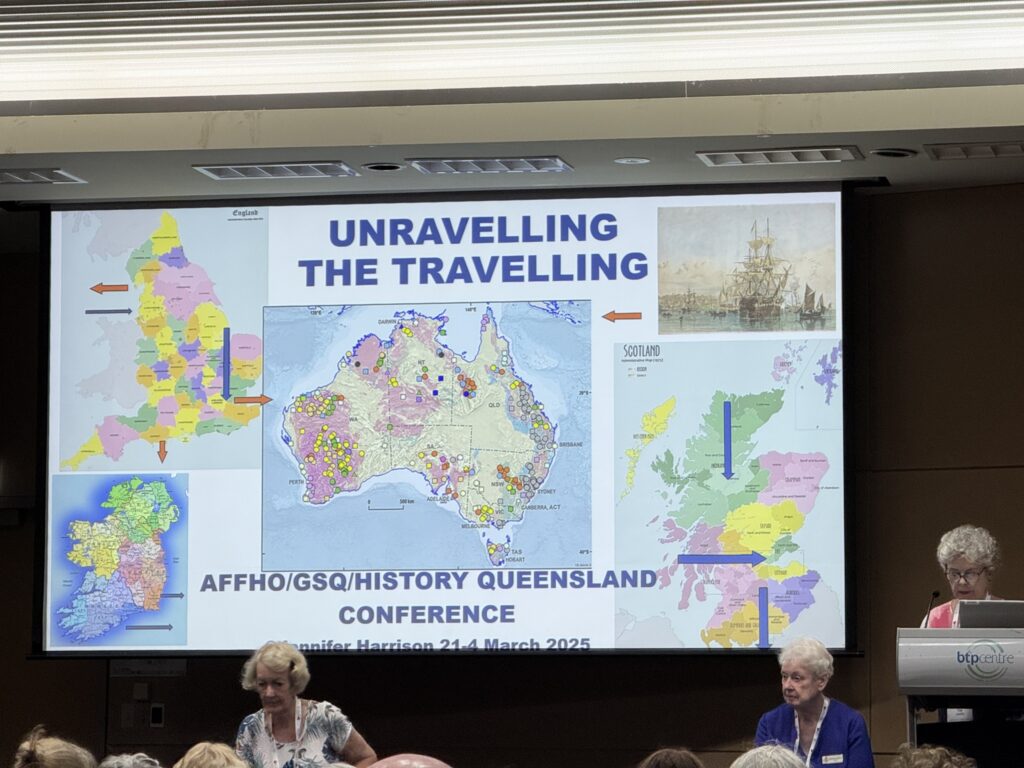
Author Jennifer Harrison in blue waiting to be introduced at the recent conference. Image by R.Edes

Nice Blog Jennifer 🙂
You’ve captured it perfectly Jennifer. So good to see you and other mates during the conference as well as learning heaps
Nice conference David, 🙂 thank you and your team. Jen H.
Pauleen: Always great to catch up with you and talk tactics- among other stimuli… Good girl. Jen H.
Jennifer, sounds like you had a ball. Really wished I’d been there.
I have always found conferences incredibly stimulating and full of new ideas. I try to be a good attender and not to miss a session, if possible. Often exhausting but in the best way. Hope you try it soon. Jenoifer H.